Vale: The pride of Brazil becomes its most hated company
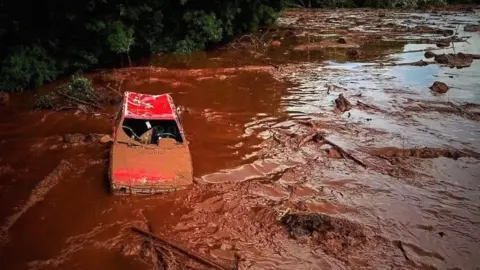 Gettyimages
GettyimagesAs Brazil is coming to grips with what may be the worst industrial accident in the country's history, the national mood is rapidly shifting from grief to outrage.
So far all focus has been on retrieving bodies, but too much time has already passed since last Friday's breaking of the Feijão dam, in the town of Brumadinho.
Now investigators, politicians, business leaders and society are turning their attention to Vale - the company that runs the dam.
They want answers to the following questions:
- How negligent was Vale in its risk management?
- Did the company learn any lessons from the similar incident in 2015?
- Are Brazilian legislation and lawmakers also to blame?
Vale isn't just any company in Brazil.
It is one of its most prized success stories in business, and along with Petrobras and Embraer remains one of the few national players to have achieved a truly competitive status on a global scale.
Today, it is the world's fourth largest mining company, with revenues of $34bn (£26bn; €30bn) in 2017 - the number one producer and exporter of iron ore.
It is such an important player in commodities that global iron ore prices spiked 5.8% after the accident, as any glitch in Vale operations can cause disruptions of supply in the markets.
Vale is also the second most-traded share in Brazil's stock exchange, behind Petrobras.
Formerly known as Companhia Vale do Rio Doce (the River Doce Valley Company), it was created by the government in the 1940s during a period of intense industrialisation of Brazil, that was coupled with the state's desire to seize control of strategic natural resources in the country.
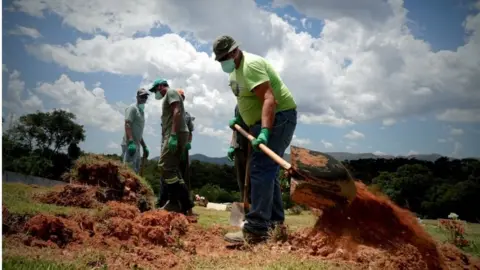 EPA
EPAIn the late 1990s, Vale was privatised and since then it has undergone a period of rapid expansion, often winning awards for its management, and even for sustainable initiatives.
It is now owned by a diverse group of shareholders that include a private bank, Brazilian pension funds and the government.
But the Vale that is emerging from the crisis now is a starkly different company.
On Monday, it saw almost $20bn wiped off its stock market value as the share price plunged almost 20%.
As investors were dumping the stock, protestors threw mud in Vale's headquarters in Rio and painted "murderers" and "it was not an accident" on its façade.
The company already had its image severely tarnished after the breaking of the Samarco dam - a joint venture with BHP Billiton - near the city of Mariana in 2015.
A structural failure in the dam killed 19 people and polluted much of the River Doce.
The disaster saw Samarco - the Vale and BHP Billiton joint venture - paying out billions in compensation and setting up Foundation Renova, a body supposed to help victims rebuild their lives and restore the river.
But there was much controversy on both fronts.
Families complain that the Foundation never found a proper compensation formula to establish how much each person should get.
Some fishermen, affected by a fishing ban in the River Doce, complain that their pay packages are way below their old incomes. They say many people who never depended on the river are also claiming compensation and that the Foundation does a poor job in evaluating each case.
The Foundation acknowledged the problems but said it had to rely on people's good faith.
Although the Foundation is independently run from Samarco, with a separate board, the communities around the River Doce see it as a mere extension of the company.
Three years on, the mood in the towns is of desolation, with unemployment and alcoholism plaguing families.
The legal process also became bogged down.
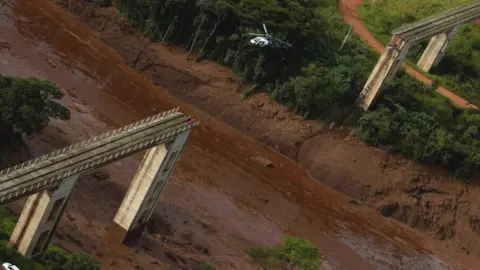 Getty Images
Getty ImagesMore than 20 people - including Samarco executives - were charged with various crimes, including homicide, but a trial date was never set.
No one was convicted or jailed.
In 2017, Samarco managed to get a court order suspending criminal proceedings, on the grounds that that investigators allegedly used illegal wire-tapping when gathering evidence.
And Samarco is still contesting environmental fines imposed by government agencies.
Despite all these problems, many communities in the Minas Gerais region of Brazil are supportive of mining. They rely on the industry for their livelihoods.
Vale and BHP Billiton are still working on reopening the Samarco operation, which has remained closed since 2015.
Vale managed to rebuild itself in the aftermath of the 2015 crisis, with robust profits and great prospects for the coming years.
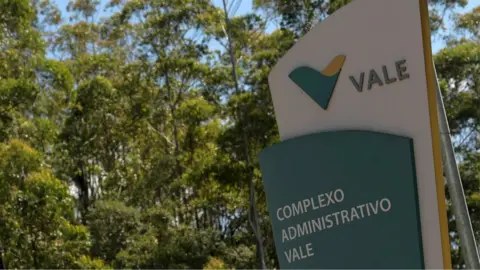 Reuters
ReutersBut after the recent Feijão accident, the company is under greater pressure than ever before.
This is shaping up to be the worst human tragedy in the history of Brazil's industry.
Five people have been arrested already. Billions have been frozen in assets in Brazil and a class action has already been filed in the US by investors.
Companies that work with Vale are also being targeted.
Two workers from Tüv Süd - a German company that assessed safety conditions in Feijão - were amongst those arrested.
Vale has announced that it will decommission all 10 remaining "tailings" dams of this type, which are often made from earth and used to store the often toxic mining by-products.
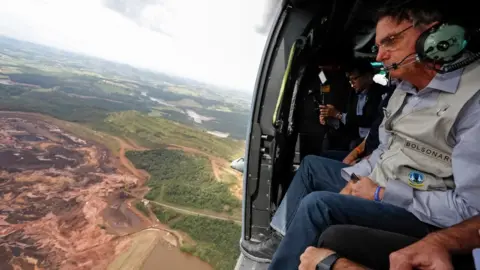 EPA
EPAIt says it will investigate more expensive waste management options and significantly reduce its output.
Jimena Blanco, an analyst for Verisk Maplecroft, says the Feijão accident could mark severe changes in Brazil, the mining industry and Vale. Investors worldwide will have less appetite for high-environmental risk opportunities, she believes.
And Brazil's new President Jair Bolsonaro - who wants to relax environmental restrictions on the mining industry - may have to review his stance.
"We expect community opposition to the industry stemming from concerns over water usage, pollution and soil contamination to increase, both against new and existing projects," says Ms Blanco,
"In addition, there will be greater scrutiny from civil society and international environmental activists."
In recent years a large scale corporate scandal involving another formerly beloved company, Petrobras, prompted a long debate and regulatory changes in the way Brazil deals with corporate corruption and political financing.
This second Vale tragedy could force Brazilians to hold a long-overdue debate about the environmental effect exploitation of its natural resources is having.
